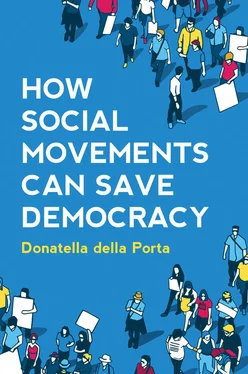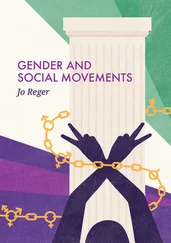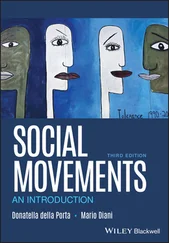In this direction, I define as progressive those social movements that share with the so-called left-libertarian movement family of the past a combined attention to social justice and positive freedom (della Porta and Rucht 1996). Progress is thus understood as:
the liberation (or ‘emancipation’) of collectivities (for example: citizens, classes, nations, minorities, income categories, even mankind), be it the liberation from want, ignorance, exploitative relations, or the freedom of such collectives to govern themselves autonomously, that is, without being dependent upon or controlled by others. Furthermore, the freedom that results from liberation applies equally to all, with equality serving as a criterion to make sure that liberation does not in fact become a mere privilege of particular social categories. (Offe 2011, 79-80)
In Forst’s terms, I address ‘empowerment initiatives’, ‘especially those where underprivileged groups . . . win participation rights through social struggles’, thus aiming at expanding the scope of agency for individuals as well as collectives. Among them are movements that called for broader inclusion of citizens and reducing domination within and across national borders (Ypi 2012). While progressive movements are my main focus of analysis, I will argue that some of these actors’ claims for broader participation and recognition in the public sphere can spread beyond the original promoter and be articulated by various actors with more ambivalent positions towards global justice. I will also discuss to what extent democratic innovations promoted by progressive social movements can be appropriated by regressive actors.
Studies of social movements have focused especially on their progressive variety, pointing at their emancipatory potential. At the onset of social movement studies, research on collective behaviour by scholars close to the so-called Chicago School stressed that collective phenomena do not simply reflect social crisis, but rather produce new solidarities and norms, which function as drivers of change, especially in the value system. Students of collective behaviour referred to these interpretations in looking at social movements in moments of intense social change (e.g. Blumer 1951; Gusfield 1963; Turner and Killian 1987). Rooted in symbolic interactionism, they gave particular relevance to the meaning attributed to social structures by actors, and focused on how social action based on new norms transformed institutional behaviour (della Porta and Diani 2006, 12–13).
Likewise in research within the new social movement perspective, which paid attention to macro-level social transformations, social movements have been considered as main actors of innovation. Opening the scientific debate on the emergence of new conflicts, Alain Touraine (1985) has considered social movements as constituting the opposition to dominant powers within different societies. In contemporary ones, social movements struggle for control of emerging programmed societies, in which knowledge is especially relevant. Within a resonant approach, Alberto Melucci (1982, 1989, 1996) has paid particular attention to movements as producers of norms in contemporary societies defined as highly differentiated and increasingly investing in the creation of individual autonomous centres of action, but also extending control over the motives for human action. In this perspective, rather than limiting themselves to seeking material gain, new social movements promote ‘other codes’ in order to resist the intrusion of the state and of the market into the everyday life of citizens. Conflicts have therefore been seen as oriented towards the control of meanings, the circulation of information, the production and the use of scientific knowledge, the creation of cultural models for individual and collective identities. Traditionally associated with disruptive forms of political participation, in the Habermasian account of social life movements assume a positive role in mobilizing to resist the invasion of the logics of the system (Habermas 1985).
More recent social science literature has considered social movements as ‘learning sites’ (Welton 1993), capable of building knowledge through discursive processes which consist of the ‘talks and conversations – the speech acts – and written communications of movement members that occur in the context of, or in relation to, movement activities’ (Benford and Snow 2000, 623). Addressing the importance of movements as producers of knowledge, Eyerman and Jamison (1991, 68–9) singled out three dimensions of their cognitive praxis: a cosmological dimension addressing the ‘common worldview assumptions that give a social movement its utopian mission’; a technological dimension which addresses ‘the specific technological issues that particular movements develop around’; an organizational dimension as ‘a particular organizational paradigm, which means they have both ideals and modes of organizing the production and . . . dissemination of knowledge’.
Research on knowledge-practices within social movements singled out a broad range, moving:
from things we are more classically trained to define as knowledge, such as practices that engage and run parallel to the knowledge of scientists or policy experts, to micro-political and cultural interventions that have more to do with ‘know-how’ or the ‘cognitive praxis that informs all social activity’ and which vie with the most basic social institutions that teach us how to be in the world. (Casas-Cortés et al. 2008, 21)
In fact, social movements are: ‘1) engaging in co-producing, challenging, and transforming expert scientific discourses; 2) creating critical subjects whose embodied discourse produces new notions of democracy; and 3) generating reflexive conjunctural theories and analyses that go against more dogmatic and orthodox approaches to social change, and as such contribute to ethical ways of knowing’ (Casas-Cortés et al. 2008, 22). Practices of knowledge are both formal and informal, as the activist knowledge is formed through different types of knowledge-practices including concepts, theories and imaginaries as well as methodological devices and research tools. Moreover, they ‘entail practices less obviously associated with knowledge, including the generation of subjectivities/identities, discourses, common-sense, and projects of autonomy and livelihood’ (Casas-Cortés et al. 2008, 28).
Social movements are first of all important actors in what Rosanvallon (2006) defined as counter-democracy, in that they criticize hegemonic thinking, especially its impact on subalterns. In fact, progressive social movements play a counter-hegemonic function (Freire 1996) as
the character and relational mode of oppressed people tends to be marked by the identification with the oppressor and an often unintentional desire to emulate him/her in terms of identity, position in the social structure and ways of relating to the ‘other’. If that often unconscious tendency is not identified and actively deconstructed, the odds are that the oppressive relationship will be reproduced, this time with new protagonists. (Motta and Esteves 2014, 2)
This critique of existing knowledge aims in particular at the unlearning of the dominant discourses, and the learning, instead, of oppositional and liberatory ones (Foley 1999, 4).
Learning is then oriented towards emancipation, going beyond the critique of hegemonic thinking and experimenting instead with alternatives. Being self-reflexive actors, progressive social movements acquire and produce knowledge in different stages of their activities. Learning is related to participation in the general activities of progressive movements, including meetings, protest, organizing, educational activities, as well as in self-reflection on their actions (Mayo and English 2012, 202–3).
Читать дальше












